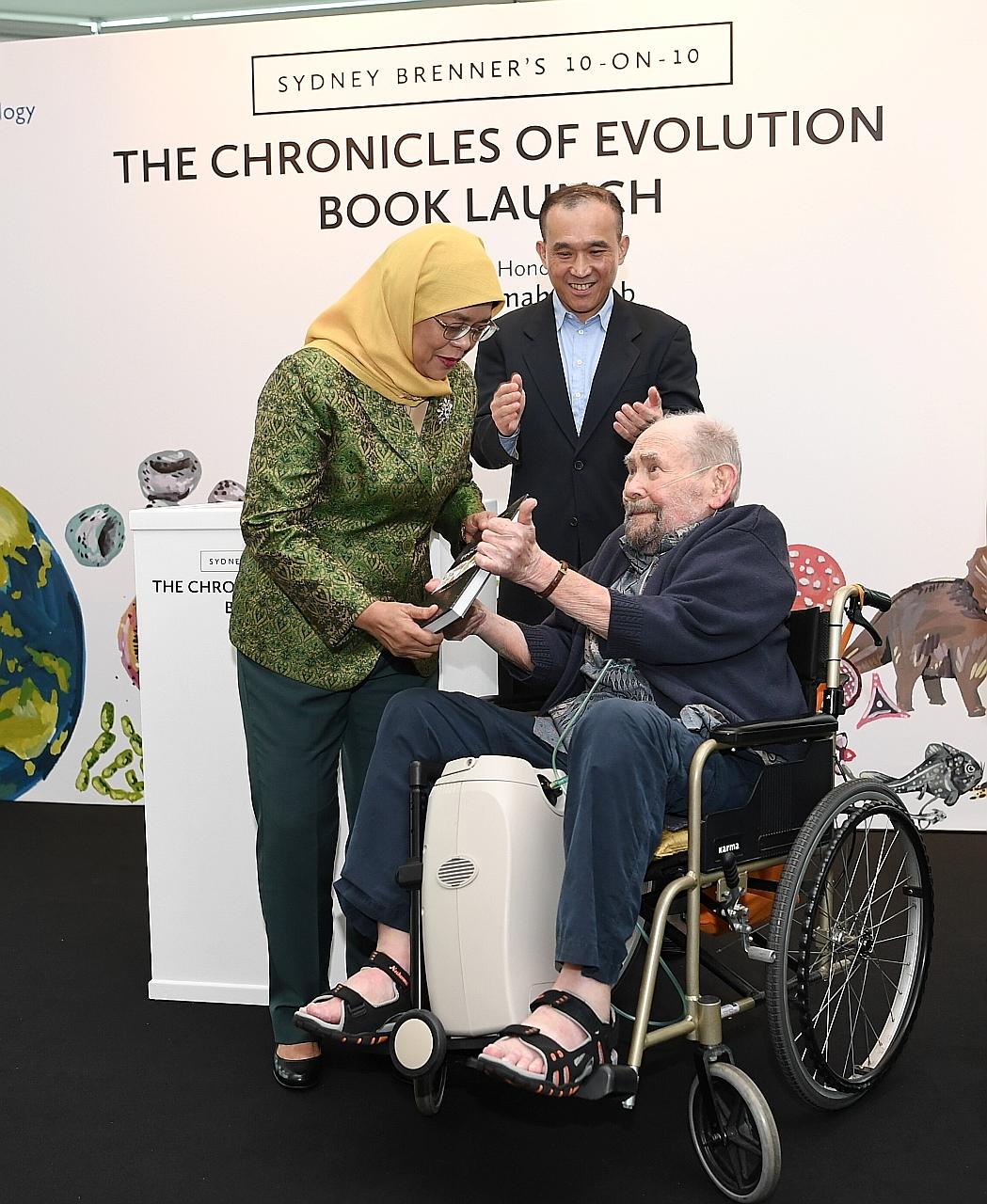Nobel laureate's book traces 14b years of evolution
Sydney Brenner puts together compilation of lectures in series he co-organised last year
Sign up now: Get ST's newsletters delivered to your inbox

President Halimah Yacob and A*Star chairman Lim Chuan Poh at the book launch of Sydney Brenner's 10-On-10: The Chronicles Of Evolution, the brainchild of Nobel laureate Sydney Brenner.
ST PHOTO: KHALID BABA
Ever wondered whether early humans interbred or how armoured fish reproduce?
The answers can be found in a richly illustrated book that is the brainchild of Nobel laureate Sydney Brenner, who has been living in Singapore since 1984.
Titled Sydney Brenner's 10-On-10: The Chronicles Of Evolution, it is a compilation of lectures in a series the 91-year-old genetics pioneer co-organised last year.
The book, launched at the National Library yesterdayby President Halimah Yacob, takes readers on a journey through 14 billion years of evolutionary history, from molecular fossils to the rise of humankind and beyond.
President Halimah said the book shows his passion to teach young people how to think about science and research.
She also lauded his contribution in the past 3½ decades to policies and initiatives here that have left a deep imprint on science in Singapore.
"Looking ahead, there is little doubt that science and technology will have to be a competitive advantage for Singapore, and continue to contribute to growing our economy and improving the lives of our people," Madam Halimah added.
Copies of the book will be donated to Singapore schools and public libraries by the Agency for Science, Technology and Research (A*Star), which commissioned the book.
Dr Brenner is a renowned pioneer in the field of molecular biology and his work in genetics won him the Nobel Prize in Physiology or Medicine in 2002. In his nearly 35 years here, he has helped shape Singapore into a scientific powerhouse.
Last year, he co-organised a lecture series in Singapore in a bid to describe and explore the 10 logarithmic scales of time, from the Big Bang to the present.
The lectures were adapted for the book, with contributions from 24 luminaries from, among others, the world of science.
They include Nobel laureate Jack Szostak, who studies the origin of biological life, and paleogeneticist Svante Paabo, whose laboratory worked on sequencing the genomes of early humans like the Neanderthals and the Denisovans.
Dr John A. Long, strategic professor in Paleontology at Australia's Flinders University, also contributed an article on the early evolution of vertebrates, tracing the sexual behaviours and reproductive patterns back to the time of armoured fish.
"We are trying to tell the story of evolution in a way that's not been told before," said executive director Benjamin Seet at A*Star's Biomedical Research Council.
"It takes a broader look at evolution, even looking into the future of where evolution will take us, communicated in a thought-provoking way that is easy to understand."
Dr Brenner's work, however, reaches beyond that book.
He is featured in two books launched on Thursday by World Scientific Publishing and Nanyang Technological University.
One is In The Spirit Of Science, a compilation of lectures, with many anecdotes from Dr Brenner on the last six decades of his field of study. He co-authored the book.
The other is Grand Challenges For Science In The 21st Century , in which he wrote an essay encouraging scientists to go forth bravely in their areas of study.
"The future is full of new questions," writes Dr Brenner, in the foreword of 10-On-10. "Will genetic engineering allow us to create new sources of food, and will we be able to create new minds in computers?
"These are new elements in a complex world, and they will bring about new changes."


